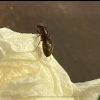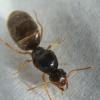Hey folks. So I've had a lasius (possibly americanus) queen for around a month and a half now, and she has quite a pile of brood; I think it's fluctuated a bit, but I'd say somewhere between 30-50 eggs. The thing is, I haven't noticed any that have developed into larvae yet. My room stays pretty warm, between 75-85 degrees, because I don't have an AC and I'm in NYC. This is my first time founding a Lasius queen, so I'm wondering how normal it is for eggs to take this long to hatch. Is it a sign of infertility, perhaps, or is she just a slowpoke? Or is this normal?
- Formiculture.com
- Forums
- Gallery
- Members
- Member Map
- Chat



















